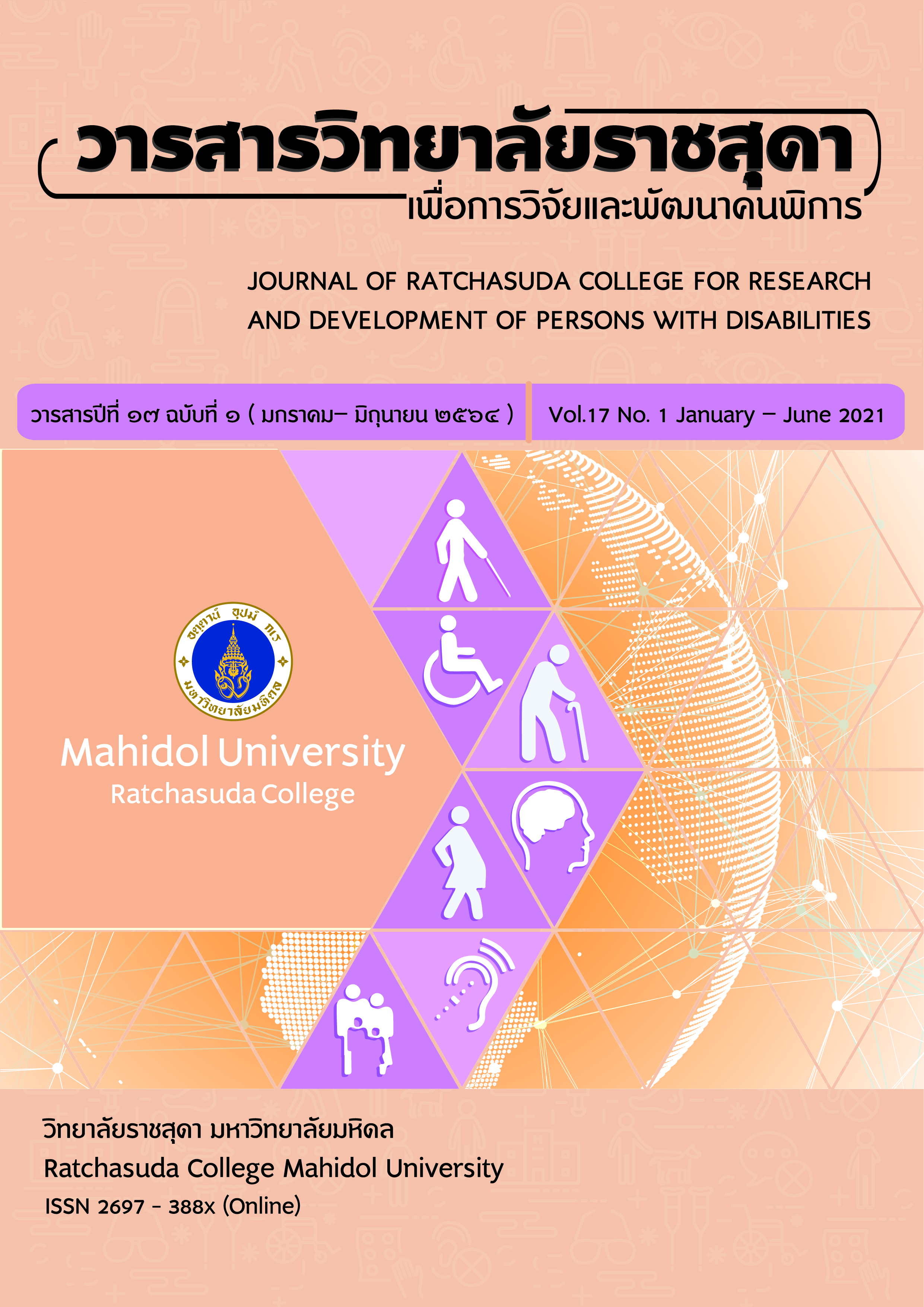The Development of Self-Esteem in Underprivileged Children who have Self-stigma due to Illiteracy: Participatory Action Research
Keywords:
Self-Esteem, Underprivileged children, Self-stigma, Participatory Action ResearchAbstract
The purposes of this participatory action research were to develop empowerment teaching techniques and form a guideline for the development of self-esteem among underprivileged children, who self-stigmatized as illiterate. The research participants were divided into three groups, consisting of insider, outsiders, and researchers with a total of nine people. This qualitative data was analyzed using several methods including documentary analysis, in-depth interviews, observation, focus groups, and field survey. The findings from content analysis were suggested that participants valued the development of self-esteem for underprivileged children. Furthermore, participants worked together to accomplish the followings for underprivileged children who stigmatized themselves as illiterate: 1) Produce new knowledge with the consciousness in the development of self-esteem 2) Teaching techniques, which allow underprivileged children to develop self-esteem 3) The reflections from participants were implemented into the process and developed into a guideline for self-esteem development 4) Able to create a guideline and planning procedure for teachers and students to transfer knowledge about teaching techniques for self-esteem development among underprivileged children who stigmatized themselves as illiterate.
Downloads
References
Boonyang, S. (2018). Self-Stigma experience in persons with alcohol dependence. The degree of Master of Nursing Science in Nursing Science. Field of Study of Nursing Science. Faculty of Nursing. Chulalongkorn University.
Brighttoday. (2020). Social media. Retrieved from https://www.brighttv.co.th/social-news
Christie, M., Michael, C., Ann R., & Peter G. (2015). Putting transformative learning theory into practice: Australian Journal of Adult Learning, 55(1).
Department of Mental Health. (2020). Delve into the health system. Retrieved from
https://www.hfocus.org/content/2018/01/15222
Dutsadeemeta, J. (2014). Self-Compassion: The Alternative for Balancing Self-Esteem). Journal of Research and Curriculum Development, 5(1), 25-38.
Freire, P. (1994). Pedagogy of Hope. New York: Continuum.
Freire, P. (2017). Pedagogia da autonomia. São Paulo: Paz e Terra.
Henry, A. (2010). Rethinking Education as the Practice of Freedom: Paulo Freire and the promise of critical pedagogy. Policy Futures in Education, 8. Retrieved from http://dx.doi.org/10.2304/pfie.2010.8.6.715
Kemmis, s. & McTaggert, R. (1988). The Action Research planner. 3rd eds. Geelong, Victoria, Australia: Deakin University Press.
Lucksted & Drapalski. (2015). Self-Stigma Regarding Mental Illness: Definition, Impact, and Relationship to Societal Stigma. Retrieved from https://www.researchgate. net/ publication/278330601_Self Stigma_Regarding_Mental_Illness_Definition_ Impact_and_Relationship_to_Societal_Stigma
Meetam, Th. (2019). To chasing the chances in crisis perfect storm for stigma childrens with Dr. Prasert produced the printing. Retrieved from https://www.the101. world/ prasert-interview-early-childhood/
Mezirow, J. (1991). Transformative dimensions of adult learning. San Francisco: Jossey-Bass
Mezirow, J. (1997). Transformative Learning: Theory to Practice’, New Directions for Adult and Continuing Education, 74, 5-12.
Na Phikun, P. (2008). A study of self-Esteem and group counseling model construction for developing self-esteem of northern adolescent students. The Doctor of Education degree in Counseling Psychology at Srinakharinwirot University, Bangkok, Thailand.
O’Toole. (2001). Student-centred teaching in Initial Teacher Education.International Journal for Cross-Disciplinary Subjects in Education (IJCDSE), 6(1).
Perry, Y., Petrie.K, Buckley. H., Cavanagh. L., Clarke, D., Winslade, M., Pavlovic. D., & Manicavasagar, V., Christensen, H. (2014). Effects of a classroom-based educational resource on adolescent mental health literacy: A cluster randomised controlled trial. Journal of Adolescence. 37(7), 1143-1151.
Pholphet, K. & Tuntasood, B. (2016). Self-Esteem and Facebook Addicted of High School Students in Bangkok Metropolitan Area. Retrieved from https://he01.tci-thaijo.org/index.php/JPAT/article/view/68075
Wachtel. (2007). CARL ROGERS AND THE LARGER CONTEXT OF THERAPEUTIC THOUGHT Psychotherapy: Theory, Research, Practice, Training, 44(3), 279-284.
Suttinarakorn, W. (2017). Participartory Action Research and Consdientization. Bangkok: 57-73
Downloads
Published
How to Cite
Issue
Section
License
บทความที่ได้รับการตีพิมพ์เป็นลิขสิทธิ์ของวารสารสถาบันราชสุดาเพื่อการวิจัยและพัฒนาคนพิการ






